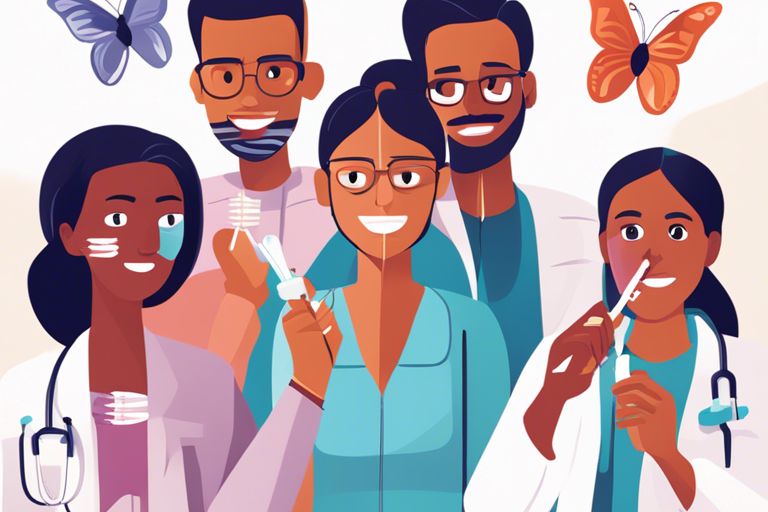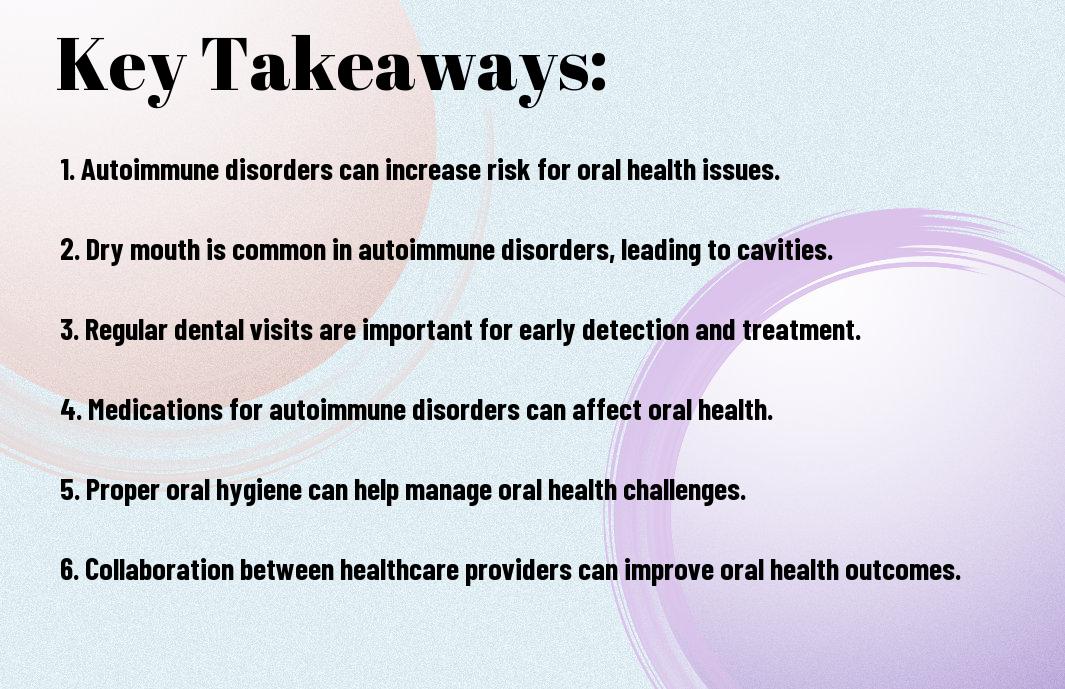Disorders such as lupus, rheumatoid arthritis, and Sjögren’s syndrome can present unique challenges when it comes to oral health. Individuals with autoimmune disorders often face increased risk of dental problems due to medication side effects, weakened immune systems, and chronic inflammation. In this blog post, we will explore the common oral health issues that individuals with autoimmune disorders may encounter and discuss strategies to maintain good oral hygiene despite these challenges.
Common Oral Health Problems in Autoimmune Diseases
Xerostomia (Dry Mouth) and Sjögren’s Syndrome
The impact of autoimmune diseases on oral health can manifest in various forms. One common oral health problem in individuals with autoimmune disorders is xerostomia, commonly known as dry mouth. Sjögren’s Syndrome, an autoimmune disorder, specifically targets the salivary glands, leading to a decrease in saliva production.
The lack of adequate saliva in the oral cavity can result in difficulties with chewing, swallowing, and speaking. Furthermore, saliva plays a crucial role in protecting the teeth and gums by neutralizing acids and aiding in the remineralization process. Therefore, individuals with xerostomia are more prone to dental decay, gum disease, and oral infections.
Lichen Planus and Oral Mucosal Lesions
Mouth lesions such as lichen planus are another common oral health challenge observed in individuals with autoimmune disorders. Lichen planus presents as white, lacy patches or red, swollen tissues in the mouth, which can be painful and uncomfortable. These oral mucosal lesions are a result of the immune system attacking the mucous membranes in the oral cavity.
Oral mucosal lesions like lichen planus require careful monitoring and management to prevent complications such as secondary infections or malignant transformations. Dentists and healthcare providers play a vital role in diagnosing and treating these conditions to ensure optimal oral health for individuals with autoimmune disorders.
Dental Treatment Considerations for Autoimmune Patients
Precautions During Dental Procedures
Dental treatment in individuals with autoimmune disorders requires careful consideration. The immune system of these patients may be compromised, making them more susceptible to infections. Therefore, it is crucial for dental professionals to take precautions to minimize the risk of complications during procedures.
Dental procedures for autoimmune patients should be planned meticulously. Dentists should consult with the patient’s healthcare provider to assess the individual’s overall health status and any specific precautions that need to be taken. Pre-medication with antibiotics may be necessary to prevent infections, and adjustments to treatment plans may be required to accommodate any underlying conditions.
Dental Hygiene Best Practices
Considerations for maintaining good oral hygiene in autoimmune patients are vital to prevent dental problems. Regular brushing and flossing help to remove plaque and reduce the risk of gum disease and decay. However, special attention should be paid to the type of oral care products used, as some individuals with autoimmune disorders may have sensitivities to certain ingredients.
Precautions should be taken to ensure that the oral hygiene routine is gentle yet effective. Choosing a soft-bristled toothbrush and mild toothpaste can help prevent irritation while still maintaining oral health. Additionally, regular dental check-ups are crucial for early detection of any issues and prompt intervention to prevent complications.
Impact of Nutrition and Lifestyle on Oral Health in Autoimmune Conditions
After How Autoimmune Diseases Can Affect Oral Health – Colgate, it is crucial to understand the significant impact of nutrition and lifestyle on oral health in individuals with autoimmune conditions. Proper diet and lifestyle choices play a vital role in managing oral health challenges associated with autoimmune disorders.
Dietary Recommendations
Impactful dietary recommendations for individuals with autoimmune conditions include maintaining a balanced diet rich in vitamins and minerals necessary for oral health. Foods high in calcium, vitamin C, and antioxidants can help support gum health and combat inflammation. Avoiding sugary and acidic foods is important to prevent tooth decay and enamel erosion, common issues in autoimmune conditions where the immune system may already be compromised.
Including probiotics in the diet can also be beneficial for overall oral health. Probiotics not only support gut health, which is linked to oral health, but they can also help in managing symptoms of autoimmune disorders by promoting a healthy immune response.
Importance of Lifestyle Management
Recommendations for lifestyle management in individuals with autoimmune disorders extend beyond diet and include maintaining proper oral hygiene practices, regular dental check-ups, and managing stress levels. Stress can exacerbate symptoms of autoimmune conditions and impact oral health, making stress-relieving activities such as exercise, mindfulness, and adequate sleep crucial for overall well-being.
Dietary choices and lifestyle habits play a significant role in managing oral health challenges in individuals with autoimmune disorders. By incorporating a balanced diet, proper oral hygiene practices, and stress management techniques, individuals can improve their oral health outcomes and overall quality of life.
Advances in Management and Future Directions
Innovative Therapies for Oral Complications
On the forefront of managing oral health challenges in individuals with autoimmune disorders are innovative therapies that target specific pathways involved in the immune response. Biologic agents, such as monoclonal antibodies, have shown promise in treating conditions like Sjögren’s syndrome and systemic lupus erythematosus, which can manifest as oral complications. These therapies work by modulating the immune system to reduce inflammation and alleviate symptoms in the oral cavity.
Another promising approach is the use of gene therapy to target autoimmune disorders at the molecular level. By delivering therapeutic genes to cells, researchers aim to regulate the overactive immune response that leads to oral manifestations. These cutting-edge therapies hold the potential to revolutionize the management of oral health issues in individuals with autoimmune disorders.
Research Frontiers in Autoimmune Disorders and Oral Health
Management of autoimmune disorders and their impact on oral health is an evolving field with exciting research frontiers. Studies are underway to explore the role of the oral microbiome in autoimmune conditions, as alterations in the bacterial composition may influence disease outcomes. Additionally, advancements in personalized medicine are paving the way for tailored treatment strategies based on an individual’s genetic and immunological profile.
The integration of artificial intelligence and machine learning algorithms in analyzing complex data sets is opening new avenues for understanding the intricate interactions between autoimmune disorders and oral health. By harnessing the power of technology, researchers are uncovering novel insights that may lead to more precise diagnostic tools and targeted therapies.
Summing up
Conclusively, individuals with autoimmune disorders face unique challenges when it comes to maintaining oral health. The complex interplay between the immune system and oral health can lead to conditions such as dry mouth, gum disease, and increased susceptibility to cavities. It is crucial for healthcare providers to be aware of these challenges and work closely with patients to develop personalized oral health care plans to prevent complications and maintain overall well-being. By staying informed and proactive, individuals with autoimmune disorders can better manage their oral health and improve their quality of life.







